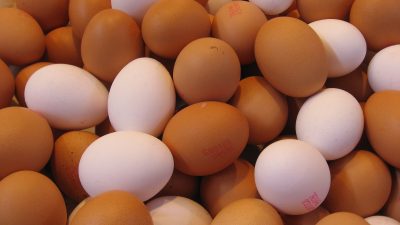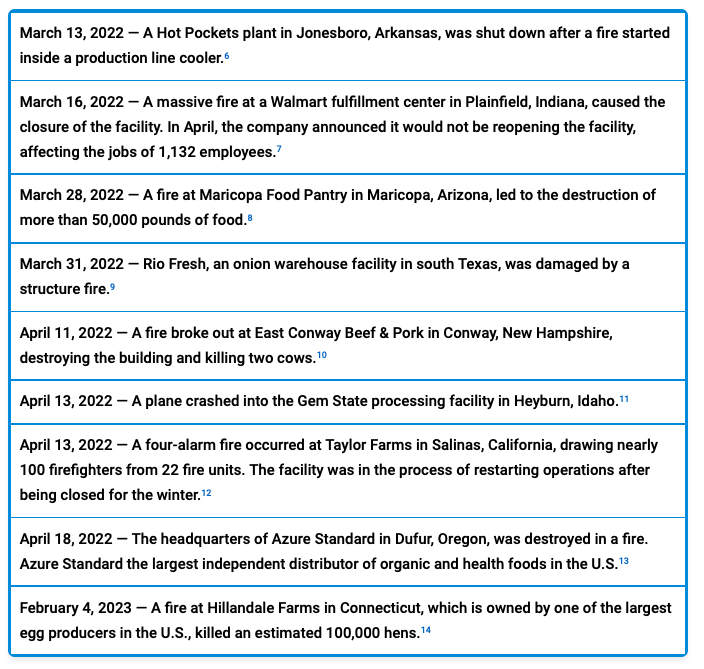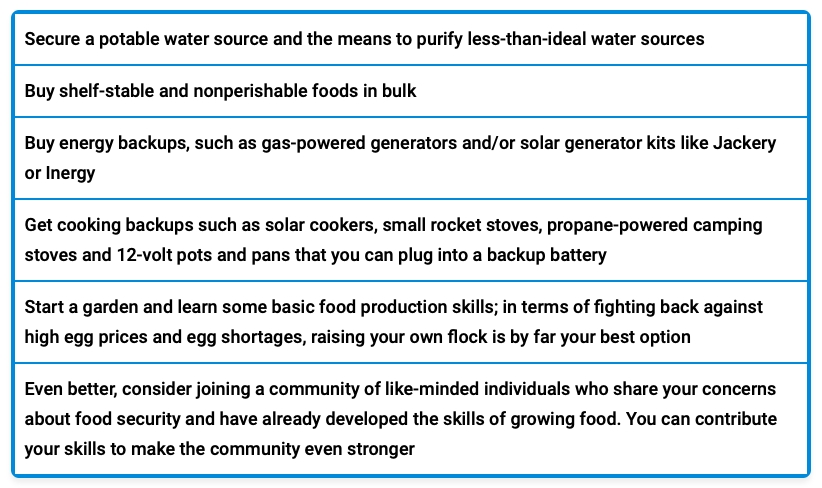Is the Egg Shortage Another Conspiracy?

All Global Research articles can be read in 51 languages by activating the Translate Website button below the author’s name (desktop version)
To receive Global Research’s Daily Newsletter (selected articles), click here.
Follow us on Instagram and Twitter and subscribe to our Telegram Channel. Feel free to repost and share widely Global Research articles.
***
Egg prices have more than doubled compared to what they were a year ago, with a median cost of $4.25 for a dozen
As of January 2023, more than 58 million birds in 47 states have been killed due to avian flu outbreaks
The egg shortage began amidst a series of mysterious fires and other disasters at U.S. food processors
Some farmers have stated chicken feed made by Purina may have been altered to contain lower amounts of protein and minerals, leaving chickens unable to lay eggs. [which has triggered bankruptcies of producers]
A report from the Rockefeller Foundation, released in July 2020 and predicting a coming food crisis, calls for the creation of a centralized “nutrition security system”
*
If the price of eggs has you seriously considering starting your own backyard flock, you’re not alone. Egg prices have more than doubled compared to what they were a year ago, with a median cost of $4.25 for a dozen.1
Many assume rising inflation is to blame, but the official narrative states avian flu, affecting up to 58 million birds, is the more likely cause.2 Another theory has surfaced from chicken farmers who have linked problems with egg laying to a certain brand of chicken feed.3 It’s also curious timing, as the egg shortage began amidst a series of mysterious fires and other disasters at U.S. food processors.
US Pledged to ‘Increase and Disseminate Food Shortages’
It’s relevant to note that in March 2022, President Biden openly stated food shortages are “going to be real.”4 He also said he spoke with European allies about “how we could increase, and disseminate more rapidly, food shortages.”5 Although it’s now been largely scrubbed from the internet, the statement wasn’t corrected by the White House. It circulated on social media, prompting Facebook to immediately flag it as fake news.
Whether the statement was the result of jumbling words or the revelation of something much more sinister is up for debate — as is the series of strange accidents at U.S. food processors that occurred in its wake. Here’s just a sampling:
Official Narrative Blames ‘Record’ Levels of Avian Flu
If you’re curious about why egg prices are rising — and egg shortages are occurring in some areas — you need look no further than the record number of chickens killed due to avian flu, according to the U.S. Centers for Disease Control and Prevention.15
Previously, the largest avian flu outbreak recorded occurred in 2015, when 50.5 million birds in 21 states were affected. However, 2022 marked a new record for dead birds in one year, when the number hit 52.7 million.16 By January 2023, more than 58 million birds in 47 states had been impacted in this outbreak.17
“I’m hopeful that this is not the new normal for us,” Richard Webby, director of the World Health Organization’s Collaborating Center for Studies on the Ecology of Influenza in Animals, told NPR.18
While some of the chickens died from the disease, most were culled to prevent further spread of the virus. Webby blamed the outbreak on wild birds, not those raised on concentrated animal feeding operations (CAFOs):19
“We don’t know exactly what it is about it, but it does seem just to be able to grow and transmit better in wild birds. Wild birds are the perfect mechanism to spread a virus because they, of course, fly everywhere.”
It does seem strange to describe wild birds as the “perfect mechanism to spread a virus,” without also pointing out that quick viral spread is virtually guaranteed on every CAFO, where birds are literally on top of each other. Still, it’s plausible that widespread avian flu could have led to chicken shortages and, therefore, egg shortages, which led to increased prices.
Anecdotal reports vary, however, about how severe egg shortages are in different areas. While some have experienced eggs disappearing from grocery store shelves, others haven’t noticed a decrease in supply at their local stores. The U.S. Department of Agriculture states that culling of chickens due to avian flu has led to a 7.5% drop in domestic egg supply each month since the outbreak began in 2022.20
Is Altered Chicken Feed to Blame?
Another theory is also circulating online — and it’s quickly been “fact-checked” and dubbed a conspiracy by the powers that be.21 It comes straight from the farmers’ mouths, however, with many noticing their hens producing significantly fewer eggs than normal.
It was suggested that chicken feed made by Purina may have been altered to contain lower amounts of protein and minerals, leaving chickens unable to lay eggs. Some farmers even stated that their hens began laying again after they switched from commercial feed to locally produced feed.
A spokesperson for Land O’Lakes, parent company of Purina Animal Nutrition, stated there have been no formulation changes to Purina chicken feed products,22 while others have called for an investigation into what could represent a potential public health and national security crisis.
Rockefeller Foundation Predicted Food Crisis
If you gain control of the food supply, you gain control of the people. This is why any threat to food freedom and security should prompt immediate alarm and calls for the protection of localized, regenerative agriculture.
It’s curious that a report from the Rockefeller Foundation, released in July 2020 and predicting a coming food crisis, hasn’t received more attention, however — especially since its solution centered on the creation of a centralized “nutrition security system.”23
A centralized food system benefits no one but those who control it, and puts consumers at risk. Will Harris, a regenerative farming pioneer who runs White Oak Pastures in Bluffton, Georgia, explained:24
“The centralization of food production impoverishes our rural communities as it creates an oligopoly. This centralization of food production is also bad for consumers. This system lacks resilience.
When mega-production facilities that are focused on efficiency break down, consumers’ access to food can become limited, which causes panic. This state of panic allows multinational companies to increase their profits exponentially. When the driving goal of our food production system is efficiency, as opposed to resiliency, consumers suffer.”
Their report, “Reset the Table,”25 was published just one month after the World Economic Forum (WEF) officially announced its plans for a “Great Reset,” and many of the contributors to the Foundation’s paper are WEF members.26 They intend for the current food system to fall apart, so they can then “solve” the problem by introducing a new system based on patented lab-grown synthetic and genetically engineered foods, along with massive insect farms.
‘Resetting the Table’ Puts Food Security at Risk
The Rockefeller Foundation states, “America faces a hunger and nutrition crisis unlike any this country has seen in generations.”27 The Foundation’s “Reset the Table” report calls for “meeting the moment to transform the U.S. food system”28 in order to solve the food crisis. But as The Corbett Report put it:29
“And their proposed solution to this crisis? Subsidies for small farmers? Development of community gardens? A new food sovereignty campaign encouraging people to get their hands dirty and start growing more food themselves?
Of course not. On the contrary, the Rockefeller Foundation wants a further centralization of control over the food supply, including ‘a new, integrated nutrition security system.’ Yes, you read that right, folks: feeding the hungry is now a ‘nutrition security’ problem that can only be solved by massive federal intervention in the food sector.”
If the Rockefeller Foundation having its hands in your ability to purchase the food you need to feed your family doesn’t sit well with you, you’re in good company. A look back at the Rockefeller Foundation’s forays into agriculture reveal why we don’t want history to repeat itself. As Corbett reported:30
“They created the Mexican Agricultural Program, which was criticized from its very inception for trying to standardize and commercialize traditional Mexican farming practices in order to benefit of the Rockefellers and their corporate cronies.
They created the International Basic Economy Corporation in Brazil to industrialize that nation’s agricultural sector, with the explicit aim of hooking its farmers on expensive machinery and Rockefeller petroleum products and finding a sustainable business model in the process.
It was John D. Rockefeller III who, when sitting on the Board of Trustees of the Ford Foundation, convinced his fellow oligarchs to join the ‘Green Revolution’ by founding the Intensive Agriculture District Programme in India, which exacerbated the disparity between rich feudal landowners and poor farming peasants.
And then of course there’s the Rockefeller’s work in Africa, which today takes the form of the Alliance for a Green Revolution in Africa. AGRA’s stated goal is to “elevate the single African voice” on the world stage.
It all sounds nice and fuzzy until you learn that 200 organizations have come together to denounce the alliance and its activities. They claim that the group has not only ‘unequivocally failed in its mission’ but has actually ‘harmed broader efforts to support African farmers.'”
Who and What Else Are Angling to Control Food?
Egg prices reaching unprecedented highs presents a hardship for many working households — but is irrelevant to the likes of Bill Gates — another major player in the quest to control the food supply.
Gates owns more farmland than anyone else in the U.S.31 and was an early backer of fake foods like the Impossible Burger and Beyond Meat.32 The acreage seems earmarked for GE corn and soy crops — the base foods for what will become an increasingly synthetic, ultraprocessed food supply make up of imitation meat and dairy.
The strong recommendation to replace beef with fake meat is also made in Gates’ book,33 a recommendation that stems from an overreaching theme of arrogance and the desire for recolonization and a global empire.
The EAT Forum, co-founded by the Wellcome Trust, also developed a Planetary Health Diet that’s designed to be applied to the global population and entails cutting meat and dairy intake by up to 90%, replacing it largely with foods made in laboratories, along with cereals and plant oils.34
In the U.S., the Board for International Food and Agricultural Development (BIFAD), an advisory board to USAID, is also on board, calling for a global transformation of agriculture and the food supply to include, among other things, “the promotion of insects as sustainable sources of proteins.” Referring to a BIFAD working paper, Corbett explains:35
“USAID’s ‘leverage’ over developing countries — specifically referenced no less than 125 times — gives an insight into the Kissingerian food-as-a-weapon mentality that is the very basis of USAID and its mission. The entire enterprise reeks of a neocolonial landgrab masquerading as ‘philanthropy’ — the kind of territorial taking that people in Africa and elsewhere have been warning about for decades.”
Get Prepared for Survival
At some point in time, the globalist cabal will start using food to control people’s behavior. So, it’s always best to have the resources on hand to survive, including becoming more self-sufficient in the short-term. By creating alternative parallel food systems locally, outside of the globalists’ control, it builds long-term independence. Basic suggestions to build your own food security safety net include:
*
Note to readers: Please click the share buttons above. Follow us on Instagram and Twitter and subscribe to our Telegram Channel. Feel free to repost and share widely Global Research articles.
Notes
3 Cleveland.com February 6, 2023
4 Des Moines Register August 13, 2022
5 YouTube, Fox News February 1, 2023, 0:45
6 Meat + Poultry March 22, 2022
8 Arizona Republic March 30, 2022
9 Vegetable Growers News April 1, 2022
10 The Conway Daily Sun April 12, 2022
11 Magic Valley April 13, 2022
12 King City Rustler April 21, 2022
13 The Goldendale Sentinel April 27, 2022
16, 18, 19 NPR December 2, 2022
17, 20 Newsweek January 30, 2023
21, 22 AOL February 6, 2023
23, 29, 30, 32, 35 Substack, The Corbett Report January 23, 2023
24 White Oak Pastures August 8, 2022
25 Rockefeller Foundation Reset the Table
27 Rockefeller Foundation, Report
28 Rockefeller Foundation, Reset the Table, Executive Summary July 28, 2020
31 New York Post February 27, 2021
33 Market Watch February 16, 2021
34 Eatforum.com The Planetary Health Diet
Featured image is licensed under CC BY-SA 2.0



